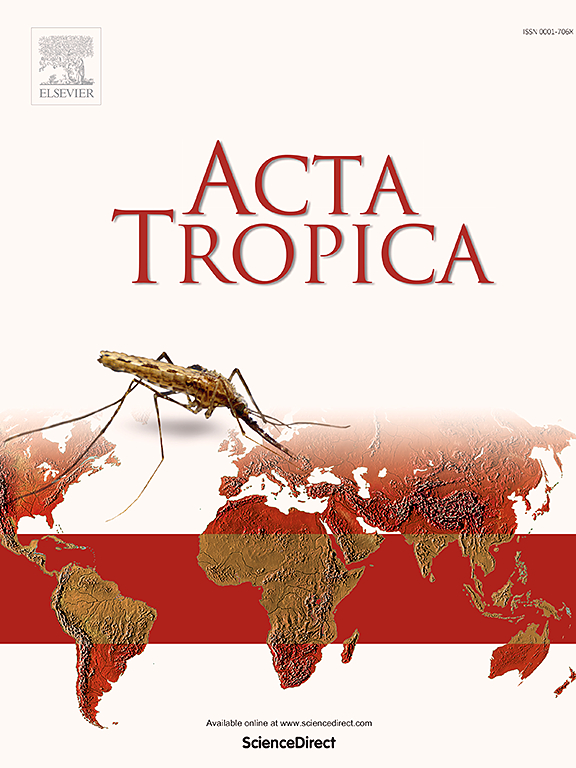对秘鲁国家森林和野生动物管理局捕获和救助的野生哺乳动物冠状病毒进行监测。
IF 2.1
3区 医学
Q2 PARASITOLOGY
引用次数: 0
摘要
冠状病毒在世界各地都很常见,可感染多种动物,包括家畜和野生动物。冠状病毒的特点是引起呼吸道、肠道、肝脏和神经系统疾病,病情轻重不一,从无症状到病情严重不等。野生动物在这类病毒中扮演着至关重要的角色,因为它们可以成为人类和家畜病原体的宿主或储库。本研究的目的是对秘鲁国家森林和野生动物管理局(SERFOR)捕获和救助的野生哺乳动物体内的冠状病毒进行分子鉴定。我们对 SERFOR 捕获和/或救助的 90 只野生哺乳动物的气管和直肠拭子进行了分子分析,部分扩增了冠状病毒 RdRp 基因。在研究的 90 只动物中,有 10 只(11.1%)仅对阿尔法康病毒呈阳性反应。这些动物是非人灵长类动物(Aotus sp.、Sapajus apella 和 Saimiri sciureus)、食蟹浣熊(Procyon cancrivorus)和南美海狮(Otaria flavescens)。对RdRp基因的部分序列分析表明,9个序列属于Pedacovirus亚属,与猪流行性腹泻病毒(PEDV)有99.1%的核苷酸同一性,只有1个序列属于Tegacovirus亚属,与猫冠状病毒(FCoV)有95.6%的同一性。研究结果表明,秘鲁的各种野生哺乳动物可以作为冠状病毒的宿主,感染家养动物。因此,有必要采取措施,帮助我们确定这些物种中冠状病毒的属和种,以预防和控制这种病毒的高重组率和变异所导致的未来流行病或大流行。本文章由计算机程序翻译,如有差异,请以英文原文为准。
Surveillance of coronavirus in wild mammals seized and rescued by the National Forest and Wildlife Service of Peru
Coronaviruses are common around the world and infect a wide variety of animals, including domestic and wild ones. They are characterized by causing respiratory, enteric, hepatic, and neurological diseases of varying severity, from asymptomatic to severe. Wild animals play a crucial role in this group of viruses since they can act as hosts or reservoirs for pathogenic species of humans and domestic animals. The purpose of this study was to molecularly identify coronaviruses present in wild mammals seized and rescued by the National Forestry and Wildlife Service (SERFOR) of Peru. We molecularly analyzed tracheal and rectal swabs from 90 wild mammals seized and/or rescued by SERFOR, partially amplifying the coronavirus RdRp gene. Ten of the 90 animals studied (11.1%) were positive only for Alphacoronavirus. These were non-human primates (Aotus sp., Sapajus apella, and Saimiri sciureus), the crab-eating raccoon (Procyon cancrivorus), and the South American sea lion (Otaria flavescens). The partial sequence analysis of the RdRp gene revealed that nine sequences belonged to the Pedacovirus subgenus and shared 99.1% nucleotide identity with the porcine epidemic diarrhea virus (PEDV), and only one sequence belonged to the Tegacovirus subgenus and shared 95.6% identity with the Feline coronavirus (FCoV). The results show that various wild mammal species from Peru can act as hosts for coronaviruses capable of infecting domestic species. Due to this, it is necessary to implement measures that help us identify the genera and species of coronaviruses in these species to prevent and contain future epidemics or pandemics resulting from the high rate of recombination and mutation of this virus.
求助全文
通过发布文献求助,成功后即可免费获取论文全文。
去求助
来源期刊

Acta tropica
医学-寄生虫学
CiteScore
5.40
自引率
11.10%
发文量
383
审稿时长
37 days
期刊介绍:
Acta Tropica, is an international journal on infectious diseases that covers public health sciences and biomedical research with particular emphasis on topics relevant to human and animal health in the tropics and the subtropics.
 求助内容:
求助内容: 应助结果提醒方式:
应助结果提醒方式:


